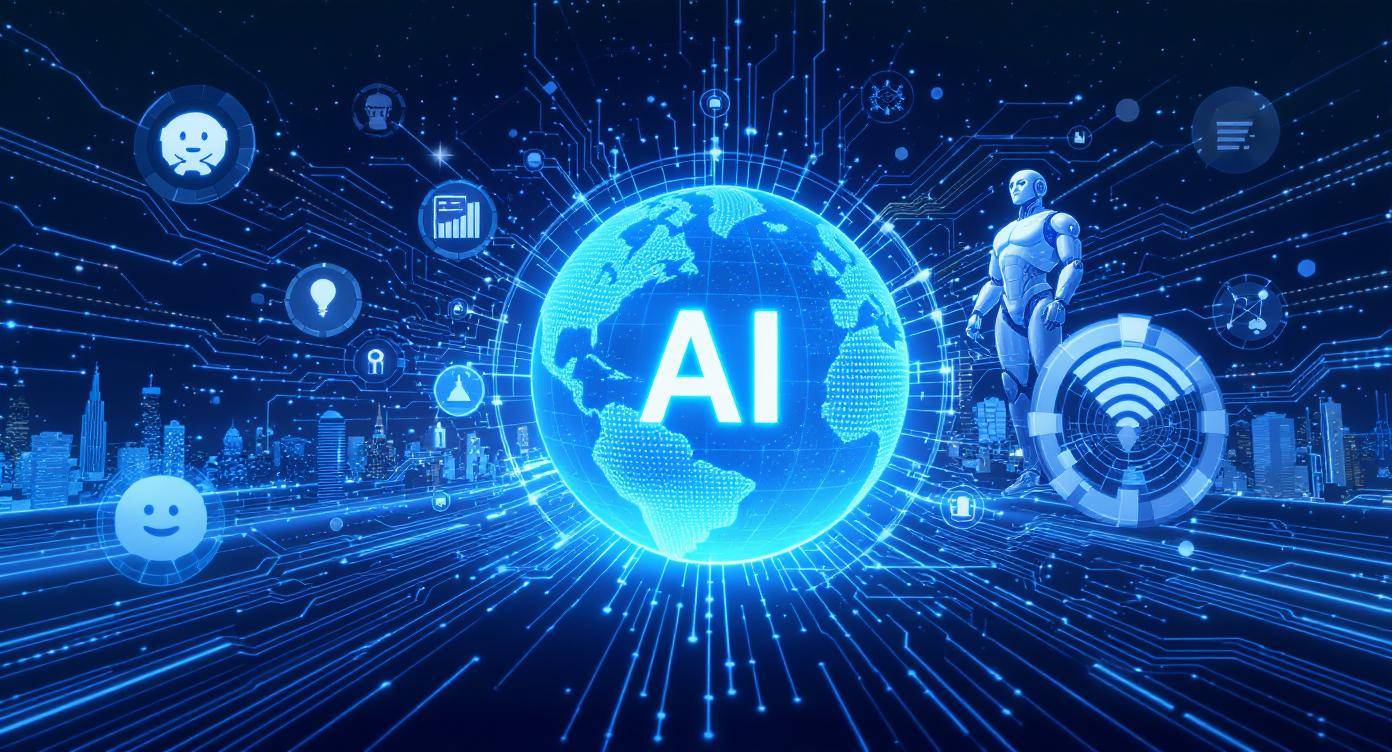Key Points
- Consumer Technology: AI is enhancing smartphones and devices with intuitive features like Apple’s Shortcuts app and Samsung’s Perplexity AI integration.
- Healthcare: AI is revolutionizing medical diagnostics and drug discovery, with tools like Google’s AlphaFold and AMIE improving patient outcomes.
- Ethics and Regulation: Concerns about AI in surveillance and content moderation highlight the need for balanced regulatory frameworks.
- Education: AI platforms like Historic Mentor are making learning interactive, while calls for early AI education grow.
- Generative AI: Advances in video and creative content generation, such as Google’s Veo 3, are pushing creative boundaries.
- Workforce and Economy: AI’s impact on jobs underscores the need for upskilling, with global competition intensifying.
AI in Everyday Life
Artificial intelligence (AI) is transforming how we interact with technology, and 2025 appears to be a pivotal year for these advancements. From smarter smartphones to life-changing medical tools, AI is becoming more integrated into our daily lives. Research suggests that these breakthroughs are not only making technology more accessible but also addressing complex challenges in healthcare, education, and beyond. However, the rapid pace of AI development raises ethical questions, making regulation a critical topic.
Healthcare Innovations
AI is making significant strides in healthcare, potentially saving lives through earlier and more accurate diagnoses. Tools like Google’s AMIE are helping doctors interpret medical images, while innovations like AI-powered hearing aids are improving quality of life for those with hearing impairments. These advancements seem likely to continue reshaping healthcare, offering personalized solutions and accelerating medical research.
Ethical Considerations
The growing use of AI in areas like surveillance and content moderation has sparked debates about privacy and accountability. While AI offers efficiency, it seems likely that without proper oversight, it could lead to unintended consequences, such as misuse in law enforcement or job displacement. The evidence leans toward the need for robust regulatory frameworks to balance innovation with societal well-being.
Looking Ahead
As AI continues to evolve, its impact on education, creativity, and the global economy is becoming clearer. From interactive learning platforms to AI-driven art, the technology is opening new possibilities. However, the global race for AI dominance and its economic implications suggest that upskilling and ethical considerations will be crucial for a sustainable future.
The Latest Breakthroughs in AI: What You Need to Know
Artificial intelligence (AI) is advancing at an unprecedented pace, and 2025 has already proven to be a landmark year for groundbreaking developments. From transformative applications in consumer technology to life-saving advancements in healthcare and critical discussions around ethics and regulation, AI is reshaping industries and daily life in profound ways.
In this article, we’ll explore the most significant AI breakthroughs of 2025, their implications, and what they mean for the future. Whether you’re a tech enthusiast, a business leader, or simply curious about the future of technology, understanding these advancements is essential. For more on the latest AI developments, check out our top AI news in 2025.
AI’s evolution in 2025 is not just about technical progress; it’s about how these innovations are integrating into our lives, solving complex problems, and raising important questions about responsibility and societal impact. Let’s dive into the details.
AI in Consumer Technology
AI is becoming an integral part of everyday devices, making technology smarter and more intuitive. One of the most anticipated developments is Apple’s upgraded AI-powered Shortcuts app, set to debut at WWDC 2025. This app will allow users to automate tasks more efficiently, marking Apple’s first major step into personalized AI assistance (source). Similarly, Samsung’s partnership with Perplexity AI to preinstall its AI app on the Galaxy S26 brings advanced AI capabilities directly to consumers’ hands. Meanwhile, Google is advancing edge AI with its new app for running AI models locally on devices, enhancing privacy and reducing reliance on cloud services (source).
Small language models (SLMs) are also gaining traction, offering efficient alternatives to large language models (LLMs) while still delivering powerful capabilities. As MIT Technology Review notes, SLMs are expected to shape the AI industry in 2025 by enabling more accessible and less resource-intensive AI applications on consumer devices (source).
| Technology | Company | Key Features | Impact |
|---|---|---|---|
| AI Shortcuts App | Apple | Task automation, intuitive interface | Enhances user productivity |
| Perplexity AI App | Samsung | Preinstalled on Galaxy S26, advanced search | Broadens AI accessibility |
| Local AI Models | Runs AI on-device, privacy-focused | Reduces cloud dependency |
To see how AI is transforming industries beyond consumer tech, read our article on how AI is transforming industries.
AI in Healthcare
Healthcare is a sector where AI is making transformative strides. One of the most notable achievements is Google DeepMind’s AlphaFold, which won a Nobel Prize in Chemistry for its work in protein structure prediction. AlphaFold’s ability to predict the 3D shapes of proteins with remarkable accuracy has accelerated drug discovery and deepened our understanding of biological processes (source). This breakthrough has the potential to revolutionize how we approach diseases, from developing new treatments to understanding complex biological mechanisms.
Diagnostics.ai’s transparent machine learning platform for real-time PCR diagnostics ensures that clinical decisions are accurate and understandable, fostering trust between patients and healthcare providers (source). Google’s AMIE (AI Medical Imaging Expert) is learning to interpret medical images like X-rays and MRIs with high accuracy, speeding up diagnosis and aiding doctors in making better-informed decisions (source).
AI is also enhancing patient care through personalized medicine. By analyzing vast amounts of data, AI can tailor treatment plans to individual patients, considering their genetic makeup, lifestyle, and other factors. Additionally, AI-powered hearing aids are transforming the lives of those with hearing impairments by using advanced speech recognition and noise filtering to improve communication (source).
| AI Application | Key Benefit | Example Use Case |
|---|---|---|
| AlphaFold | Accelerates drug discovery | Protein structure prediction |
| AMIE | Speeds up medical imaging analysis | X-ray and MRI interpretation |
| Hearing Aids | Improves communication | Noise filtering for hearing-impaired |
For more on the latest AI developments, check out our AI news today.
Ethics and Regulation in AI
As AI becomes more pervasive, ethical considerations and regulatory frameworks are gaining critical importance. The European Union’s AI Act is setting a global standard for AI governance, categorizing AI applications based on risk and imposing stricter requirements on high-risk systems (source). In contrast, the U.S. regulatory environment remains fragmented, with calls for a national AI strategy to address bias, privacy, and accountability.
Ethical challenges are significant. Meta’s decision to replace human content moderators with AI systems has raised concerns about reduced safety and freedom of speech online (source). The rise of AI sextortion scams, which led to tragic consequences, has prompted legislative action like the “Take It Down Act” in the U.S. (source). Additionally, AI in surveillance and law enforcement, such as technologies bypassing facial recognition bans, is raising privacy and civil liberties concerns (source).
| Ethical Issue | Concern | Proposed Solution |
|---|---|---|
| AI Surveillance | Privacy violations | Stricter regulations |
| Content Moderation | Reduced safety | Human-AI collaboration |
| Sextortion Scams | Harm to victims | Legislative action |
These issues underscore the need for balanced regulation that encourages innovation while protecting societal values. For more insights, explore our recent innovations in machine learning.
AI in Education
Education is being revolutionized by AI. Historic Mentor, an EdTech startup’s AI platform, allows users to have conversations with historically significant personalities like Abraham Lincoln and Cleopatra, offering immersive learning experiences (source). This tool makes history interactive, redefining educational engagement.
There’s also a growing push for early AI education. Proposals like Donald Trump’s advocacy for teaching AI in kindergarten reflect the recognition of AI’s importance in future job markets (source). AI literacy is becoming essential, with less than half of adults using generative AI by August 2024 (source).
Generative AI Advancements
Generative AI is evolving rapidly. Google’s Veo 3, a high-end AI video generator, can create 1080p cinematic clips with improved motion tracking, challenging OpenAI’s Sora (source). This competition is driving innovation in video generation, opening new possibilities for content creation. AI is also being used in creative fields, with tools like Google DeepMind’s AlphaEvolve outperforming human solutions in data center management and chip design (source).
AI’s Impact on Workforce and Economy
AI is reshaping the workforce and economy. Nvidia CEO Jensen Huang’s warning that “you’re going to lose your job to someone who uses AI” underscores the urgency for upskilling (source). China’s soaring demand for AI talent, with universities expanding AI programs, highlights the global competition for AI expertise (source).
Global AI Competition
The competition in AI extends to nations. Alibaba’s Qwen3 model is narrowing the gap with U.S. tech giants, showcasing China’s advancements in cost efficiency and multilingual capabilities (source). The geopolitical chip war, with potential tariffs on China and focus on Taiwan through the CHIPS Act, underscores the strategic importance of semiconductor technology (source).
AI in Other Sectors
AI is also impacting sectors like military and sports betting. Ukraine’s use of AI-powered drones demonstrates AI’s role in defense (source). In sports betting, AI enhances predictive analytics and personalizes user experiences (source).
Looking Ahead
2025 has been a year of remarkable AI breakthroughs, transforming consumer technology, healthcare, education, and more. These advancements raise important questions about ethics, regulation, and the future of work. By staying informed, we can ensure AI is harnessed for the greater good. For more insights, explore our category on AI news.

